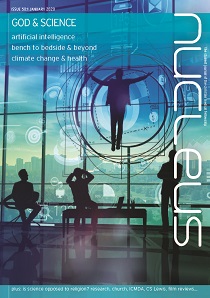Am I Just My Brain?
Sharon Dirckx
143pp, The Good Book Company, 2019.
ISBN: 9781784982751
paperback £8.00
Perfectly balancing an introduction and an explanation of one of the most topical issues in neuroscience. The book not only helped me understand the topic, but left me with a refreshed viewpoint on such matters as free will, science and the wonder of our being made in God's image.
Can mind and brain be one and the same? Although current scientific thinking may suggest that this is the case, Dirckx shows that this presumption is based on a tunnel-vision, materialist worldview and not science. Other questions follow. Has the concept of a soul been thrown out? Aren't brains just machines? Is free will an illusion? Is religious experience hard-wired into our brains? Dirckx makes a strong case that indeed we are more than our brains. She uses the brain as a 'neuro-signpost' to the beauty of a creator God and the truth of our God-given human reality.
The last part of the book challenges readers to explore the Christian worldview and what it means for us. Our response affects how we live at the most fundamental level. If we are to show the consistency, reality and amazing love that 0Christ offers, we should see the brain (and the tricky questions around it) not as a contentious issue to avoid, but as a wonderful demonstration of who God is, who we are, and our ultimate value created by the relationship between the two.
This paperback is a worthy companion when tackling some of the biggest questions in our society. It examines questions that science cannot answer, and points to the reality of who we really are, in a concise way with a bigger, better explanation. Dirckx is a former brain imaging researcher, now apologetics lecturer. The book is easy to read, with Dirckx masterfully using basic language and concepts to explain difficult yet interesting questions, in a way not always managed by other writers.
For me, Am I Just my Brain? came at a timely moment; just as I was starting my neurology block at university. Naturally, Christian friends were poked and prodded with questions and answers that may differ from those of secular friends. Many conversations, answers and conundrums were pondered, with this book acting as a firm foundation to base them on. The last chapter of the book revealed a brilliant argument for the Christian worldview by considering why we can think in the first place. No satisfactory answer has arisen from the naturalistic worldview. It is this issue that proved an excellent talking point - from neurology to Christianity - that my friends and I, greatly benefited from.
Both the Christian and the sceptic should find this book a superb introduction to the topic. It is an excellent starter guide to the realm of free will, the soul and all things brain related.Matthew Amer is a medical student in Dundee































